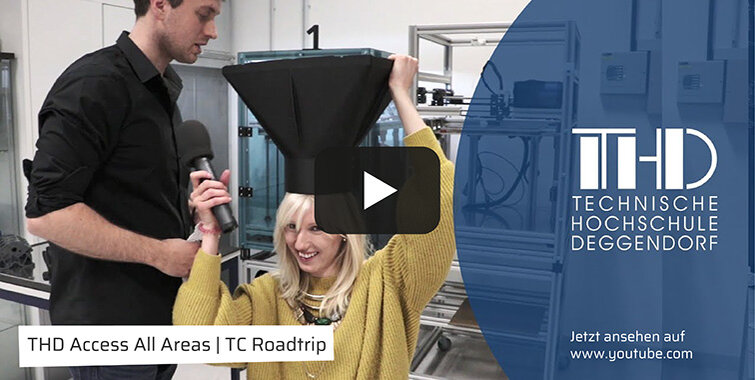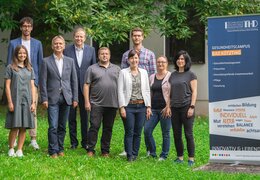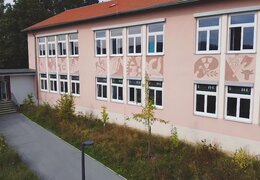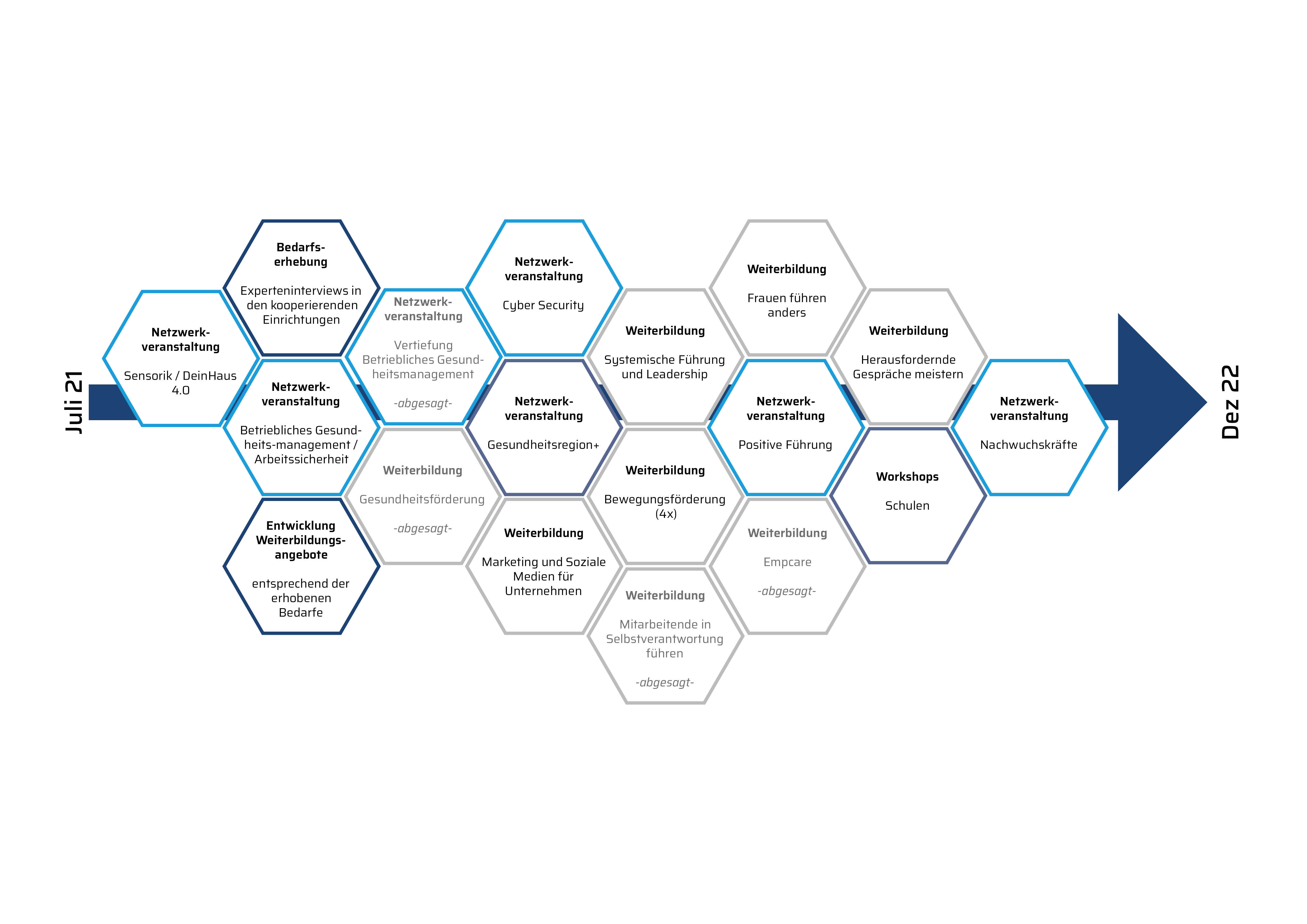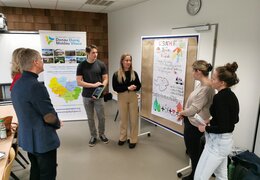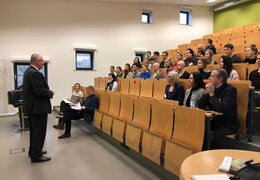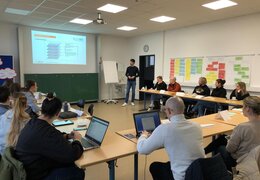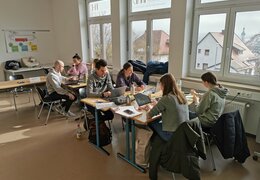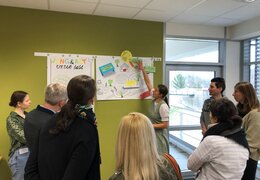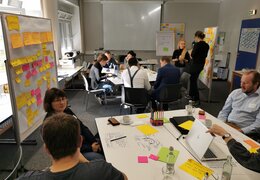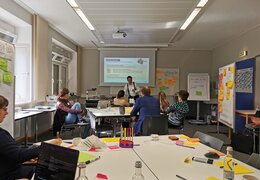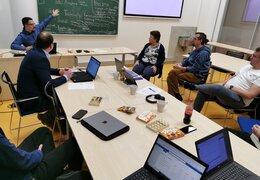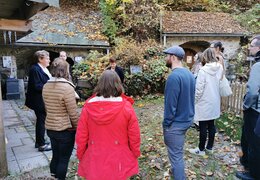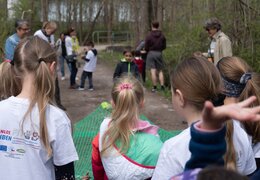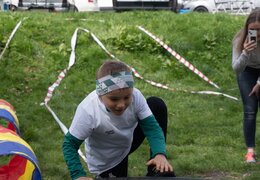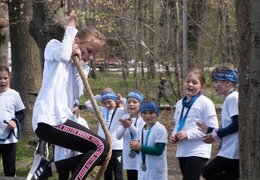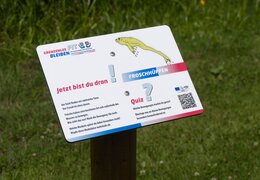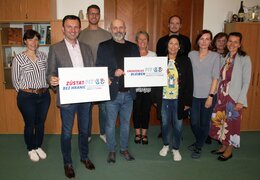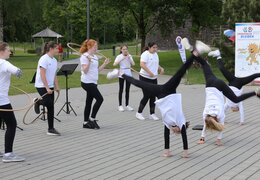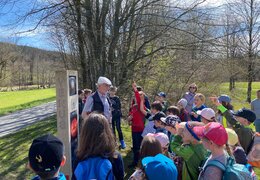research at dit
pioneering & vibrant
profile
The Bad Kötzting Health Campus of the Deggendorf Institute of Technology is concerned with application-oriented health science research and teaching. It was officially opened on 22 October 2012 by the Bavarian Minister of State for Science, Research and the Arts, Dr Wolfgang Heubisch, and is affiliated with the Faculty of Applied Health Sciences.
Scientific management: Prof. Dr. biol. hum. Horst Kunhardt and Prof. Dr. Erich Wühr
Operational management: Kathrin Martin
Staff: 9
- 2 Research assistants
- 3 Project managers
- 1 Seminar manager
- 1 Team assistant
- 2 Student assistants
tasks
- Support for company, municipal and individual health management in the prevention region Bad Kötzting/County of Cham.
- Establishment of cross-border relations with foreign universities and colleges in relation to health sciences, especially in the Czech Republic
- Establishment of networks and cooperations
- Further education and training measures for managers and employees in the health professions
- Mutual knowledge transfer between DIT and regional companies or institutions
- Application for and implementation of funding and research projects in the field of health.
The three institutions, the "Institute for Cross Border Health Care Management" under the direction of Prof. Dr. Horst Kunhardt, the honorary professorship Prof. Dr. Erich Wühr for health promotion and prevention and Prof. Dr. Stephan Gronwald with the teaching area of occupational health management and occupational safety were established to fulfil the above tasks.
current projects
Society is ageing rapidly and caring for older people is becoming a challenge. Digital solutions offer support to care staff, but the potential of digitalisation is not yet sufficiently exploited. The DigiCare4CE project promotes innovative solutions to improve the quality of care and develops a transnational strategy for the digital transformation of care facilities. The project partners test the use of new technologies in pilot measures and develop action plans for their wider implementation.
Interreg Central Europe Website Project Description
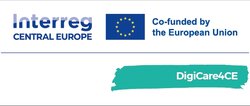
Innovative further training for the digital transformation of SMEs in outpatient and inpatient care for the elderly (TransForCare)
As fields for further training, we have identified topics through discussions with relevant institutions in which existing problems can be mitigated and future challenges can be facilitated in a preventive manner. In alignment with the topic areas, we focus here on
(1) internal digital transformation
(2) personal (digital) competences, and
(3) the re-entry into care.
Educational and project goals:
- Knowledge and competence growth of the participants in the thematic blocks
- Individual, flexible, demand-oriented learning formats
- Recruitment and retention of skilled workers through professional training in the field of care.
- Creation or expansion of a network of outpatient and inpatient nursing care
- Raising awareness for knowledge and technology transfer at the facilities
- Strategic and sustainable cooperation between the facilities
- Accompanying research on factors influencing participation in further training measures
Project partner: Health Academy of Eastern Bavaria (GAO) under the sponsorship of the Adult Education Centre in the District of Cham e.V. (vhs)
Target group: The further education programmes outlined here are aimed at various professional groups in outpatient and inpatient geriatric care facilities. These include management, executives, nursing professionals, nursing assistants, care assistants, educators and therapists, as well as employees in administration. In addition, a thematic block addresses in particular potential re-entrants who are currently employed or part-time employees with the potential to increase their working hours in care.
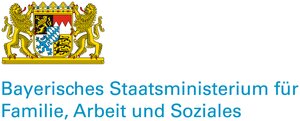
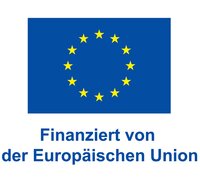

Overview EAsyAnon
- Funded by the Federal Ministry of Education and Research (BMBF)
- Research project: "Research network anonymisation for secure data use".
- Framework Programme: IT Security "Digital. Secure. Sovereign.
- Project Management Organisation: VDI/VDE Innovation und Technik GmbH
- Duration: 3 years (start 01.01.2023)
Collaborative partner
- Lead: Deggendorf Institute of Technology (TC Grafenau, TC Vilshofen, GC Bad Kötzting).
- University of Augsburg
- Passion4IT GmbH
- Smart In Media AG
- IT Security Cluster e. V.
Brief summary
Public authorities, health institutions, research institutes and companies have numerous data sets that could potentially be published as Open Data. Often, however, these data sets remain withheld from the general public due to challenges related to data protection, security and personal rights, and no social added value can be achieved from them.
The EAsyAnon project aims to facilitate the anonymisation process associated with Open Data for data stewards. To this end, an overall system consisting of three components is being developed:
I) An intelligent recommendation system that suggests a suitable anonymisation concept based on the description of a data set.
II) An audit system that evaluates the de-anonymisability of the resulting dataset. This is done on the one hand by automated methods and on the other hand by a crowd-sourced peer review process.
III) A trust service that, by means of pseudonymisation measures, allows the publication of parts of a dataset that are worthy of protection and the evaluation of encrypted data for a specific purpose, in compliance with the GDPR.
EAsyAnon is framed by empirical research, in which first concrete application scenarios are evaluated and finally the influences of the system on the open data publication process are evaluated. The evaluation is primarily based on real case studies from the healthcare sector. In addition to the technical aspects, legal and ethical issues will be considered in detail in EAsyAnon. The overall objective of the sub-project at the Deggendorf Institute of Technology is the scientific project management (in particular the conception and implementation of technical and empirical investigations), the technical conception of the overall system including the selection and development of suitable algorithms, technical procedures as well as the creation of individual partial functional models.
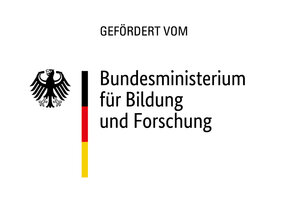

Exoskeletons are already being used more and more, especially in industrial production, because they can significantly reduce physical strain, for example when lifting heavy loads. Active exoskeletons are mainly used there.
Since such physically stressful activities also occur in the work of nursing staff, passive exoskeletons have recently also been developed for this occupational group. The health campus has two passive exoskeletons from two different manufacturers.
Nursing staff at the St. Michael retirement home in Cham tested the two exoskeletons in recent months as the first facility in the region. Other facilities are to follow so that the practical suitability and acceptance of the nursing staff towards the technical assistance systems can be better researched. A questionnaire was developed to evaluate the tests, which the nursing staff fill out after the tests.
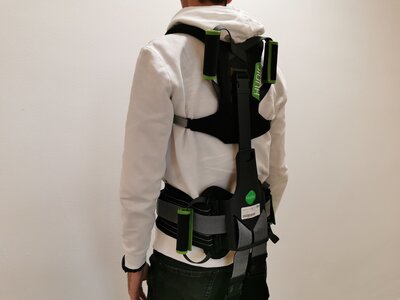
The ExRe project develops collaborative research capacities in the field of applied research and focuses on the development of a state-of-the-art lower limb exoskeleton prototype for rehabilitation purposes using innovations in design, construction technologies, 3D printing and brain-computer interface (conversion of brain signals into limb movements).
The project also strengthens joint research capacities for technology transfer in the fields of rehabilitation and prosthetics. It will be carried out by a multidisciplinary research team from Bavaria (THD with TC Cham, TC Hutthurm and GC Bad Kötzting) and the Czech Republic (ZČU in Pilsen with Faculty of Health Sciences, Faculty of Design and Art Ladislav Sutnar, Faculty of Applied Sciences and Faculty of Engineering/RTI). The partners will cooperate in all activities, exchange research expertise and utilise joint research capacities in line with the priorities of RIS3 and the high-tech agenda. The project also involves five associated partners from the field and will take 36 months to implement.

completed projects
Inno4Health offers further education and training measures for specialists and managers in companies in the health sector (clinics, nursing homes, outpatient care, rehabilitation centres, sports facilities) in the prevention region of Bad Kötzting / district of Cham. In addition, a network of DIT, companies in the health industry and educational institutions is to be established.
Many companies in the health sector were not able to offer further education and training in 2020/2021 because they were busy fighting the pandemic. This is where Inno4Health picks up. Together with the cooperation partners, the training and further education needs are identified and, in cooperation with the Centre for Academic Further Education (ZAW) of DIT, a programme is developed that is tailored to these needs. The seminars, training courses and workshops will be implemented as blended learning, incorporating innovative approaches to digital teaching. Thanks to ESF funding, these offers are free of charge for the cooperation partners.
The project also links the DIT, companies in the health sector and educational institutions with each other. This gives the cooperation partners access to health science innovations and technologies, while the university in turn receives important feedback and input from entrepreneurial practice. The network events are also intended to strengthen the cooperation of the cooperation partners in order to better face common challenges in the network, such as the recruitment of skilled workers.
The Inno4Health project, which is 100% funded by the European Social Fund (ESF), started on 1 July 2021 and runs until 31 December 2022.
Project partners of DIT:
Centre for Academic Continuing Education / Department for Digitalisation and Innovative Teaching.
Cooperation partners:
Bayerwaldklink Cham, PWS GmbH&Co. Bad Kötzting, BRK Kreisverband Cham, Pflegestützpunkt Costa Bad Kötzting, die Praxis GbR Cham, Grassl Seniorenbetreuung und Pflegedienst Miltach, Heiligenfeld GmbH Klinik Waldmünchen, Physioteam Franz Bad Kötzting, UniqueBODY Fitness & WellnessCenter Prackenbach, TCM Klinik Bad Kötzting, Ambulantes Rehazentrum Uschi Martin Bad Kötzting, Visio Klinik Bad Kötzting, Sana Kliniken Landkreis Cham.
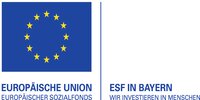
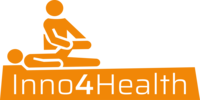
Winter School "Health Competent Community" with students from three countries
A Winter School in cooperation with the Danube-Moldova European Region took place for the first time at the Bad Kötzting Health Campus from 13-17 February. For one week, 15 students from DIT, the University of West Bohemia in Pilsen and the University of Applied Sciences Health Professions Upper Austria worked in groups on four different ideas to improve health literacy in the municipal setting. The ideas were presented to municipal decision-makers on Friday.

Three-day workshop in Regen
A three-day workshop was held from 19 - 21 October 2022 with 15 participating researchers from the Czech Republic and Bavaria. On Wednesday, a get-to-know-you excursion to the Postkeller in Regen took place, followed by a round of introductions to start the workshop. On Thursday, project ideas were developed in the form of a guided design thinking workshop. The ideas were then recorded in a writing session on Friday. The workshop took place at the Arberland Tagungshotel in Regen, Bavaria.
Participating colleges and universities:
- Deggendorf Institute of Technology (GC Bad Kötzting, TC Grafenau).
- Czech Technical University Prague
- East Bavarian Technical University Regensburg
- East Bavarian Technical University Amberg-Weiden
- University of Applied Sciences Würzburg-Schweinfurt
DIT Delegation trip to Prague
In addition, a delegation of 5 scientists from Deggendorf visited the university in Prague (6 persons) from 09 - 11 November 2022. The workshop in Regen was followed up and a project idea was further elaborated.
Further cooperation planned
On the one hand, the participants will stay in contact in the short term to continue working on the project ideas. Since the participants were able to get to know each other better and exchange ideas, it is likely that the respective expertise of the persons will also be requested for other new ideas and thus cooperation will take place.
The project was funded by the Bavarian-Czech University Agency (BTHA) and the Bavarian State Ministry of Science and the Arts (StMWK).


In the cooperation project for 2021/22 between Suŝice and the Health Campus of the Deggendorf Institute of Technology and the town of Bad Kötzting, children aged 3 to 10 are to be motivated to exercise. For this purpose, a children's rally is to be designed in the spa gardens in Bad Kötzting with several stations. The plan is to create a kind of "treasure map" that the children can fill in after completing the stations and then hand in for a reward. The aim is to explore the body in a practical way through movement by teaching the children movement sequences, exercising the body and experiencing nature. Through this, the children will gain knowledge for a healthy lifestyle. The project is developed and supervised by a bachelor student from the Faculty of Applied Health Sciences at DIT, with close links to teaching.
The project was approved by the Monitoring Committee of the European INTERREG V funding programme in mid-2016. The applicant for the project was the BRK-Kreisverband Cham as the so-called lead partner in cooperation with DIT, the Pilsen Rescue Service and the University of Pilsen. The areas included in the project in Bavaria were the districts of Cham, Freyung-Grafenau, Hof, Neustadt an der Waldnaab, Regen, Schwandorf, Tirschenreuth and Wunsiedel im Fichtelgebirge as well as the independent cities of Hof and Weiden in der Oberpfalz. In the Czech Republic, the area covers the districts of Pilsen, Karlsbad and South Bohemia. A Competence and Coordination Centre (CCC) Cross-border Rescue Service (Gü-RD) was created in Furth im Wald. The CCC bundles the competences and interests of all BRK rescue services in the border area to the Czech Republic (8 districts/ 25 rescue stations) and thus ensures qualified emergency rescue for the population. The aim of the project was practical cross-border cooperation, the generation of knowledge transfer, the dismantling of language barriers and a joint strategy development for modern and population-oriented rescue service structures. Together with the university, DIT took over the scientific monitoring. Through these efforts, the Bavarian-Czech border region grew closer together and people on both sides of the border were able to benefit. The project made a fundamental contribution to making "borderless helping" possible in the rescue services of both countries. Patients, regardless of whether they were citizens, commuters, holidaymakers or transit travellers, received cross-border care according to current medical standards and were transported by the fastest route to the most suitable destination hospital for the patient, even if this was on the other side of the border.
The project carried out by the Deggendorf Institute of Technology, Competence Centre in Bad Kötzting for the education and training of nursing staff and health care professions in the Bavarian-Czech border region aimed to strengthen the border region around Bad Kötzting. To this end, a competence centre was established in Bad Kötzting. The project was funded by the Bavarian State Ministry of Finance and Home Affairs for the period from 2016 to the end of 2020. The courses offered at the competence centre were aimed accordingly at health care personnel from Germany and abroad who had been trained for one or more years. The focus was on the promotion of professional expertise and German language skills in the context of the recognition of foreign nursing professional qualifications, support in completing the three-year nursing training in Germany and the teaching of competences for encountering different cultural groups in the healthcare sector.
vision
In general, the topics for coping with future house demands in the health sector are diverse. These include prevention and health promotion, nursing, medical care, digitalisation in the health sector and many more. Thus, the tasks of the Health Campus are also wide-ranging.
The vision of the Health Campus is to pass on evidence-based knowledge in the health sector to the actors in the health sector in the region in a low-threshold manner by building networks and cooperations with private and public institutions. To this end, projects are to be initiated in cooperation with regional and cross-border institutions. As a first step, the visibility of the Health Campus is to be increased by informing the public about ongoing projects and actively involving them.
The Health Campus has set itself the goal of gradually building up further competences. In addition to sovereign research from public funds (third-party funding), contract research for external institutions and companies is also to be carried out to gain new scientific knowledge. This is achieved by expanding human and financial resources. By winning projects and thus funding, research in the health sector can be further advanced.
The border region with various actors in the health sector has a lot of potential and should be supported and strengthened through knowledge transfer. The Health Campus wants to be in close contact with the different actors and support them through knowledge transfer. This applies to both regional and cross-border institutions. Only in this way can regional development in the health sector be advanced in the future and added value be achieved for the individual facilities and the region as a whole. Regular interdisciplinary and intercultural exchange and networking with all actors is a central building block for the successful implementation of the visions and goals.
events
Winter School: Health Competence in the interprofessional team
Are you interested in improving the healthcare system of the future? For students of various health science degree programmes with a passion for developing innovative solutions: Apply now and be part of the winter school at the Health Campus Bad Kötzting!
We aim at developing innovative project ideas in an interdisciplinary team to provide health competence in different settings. You will master new capabilities to work in health promotion. Participating in the winter school will prepare you for your future career in health promotion in an interprofessional team.
When: 5 - 9 February 2024
Where: Health Campus Bad Kötzting
Please find more information here: Winter School Health Competence in the interprofessional team
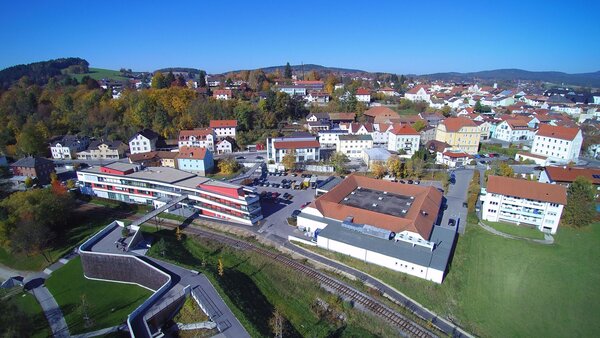
directions
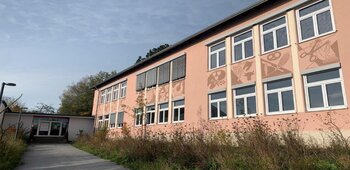 |
Deggendorf Institute of Technology Landshuter Str. 1e |
|
|
Our offices are located in the building of the former distric vocational school on the ground floor. |
